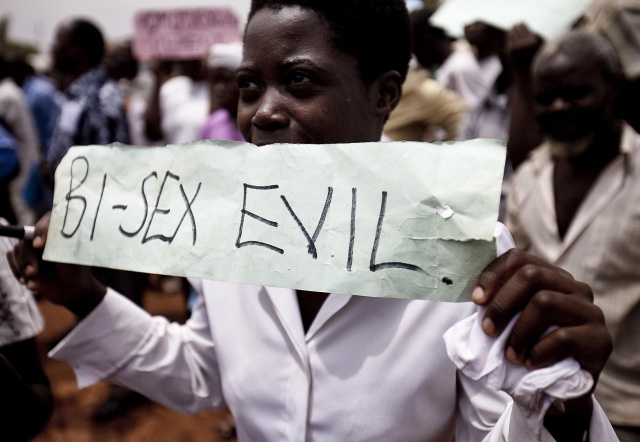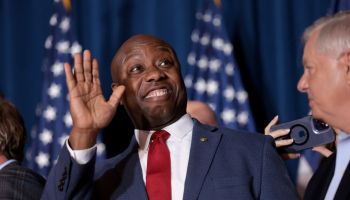
Photo taken on February 14, 2010 shows Ugandans taking part in an anti-gay demonstrations at Jinja, Kampala. A Ugandan pastor seeking to bolster Uganda’s anti-gay laws which already make homosexuality punishable by life imprisonment screened gay porn in a packed Kampala church Wednesday February 17, 2010 in a bid to drum up support that was attended by around 300 supporters after plans for a ‘million-man march’ were thwarted by police. (Trevor Snapp/AFP/Getty Images)
In the last few years, Uganda has come under almost-universal condemnation the world over for its Anti-Homosexuality Act (PDF), or its “Kill the Gays bill,” which initially called for the death penalty against LGBTQ people in the Eastern African country. This weekend, the bill’s original sponsor said he was going to reintroduce the law, which was struck down in August, according to The Daily Beast.
SEE ALSO: Liberian President Thanks POTUS For Not Caving To Fears Over Ebola [VIDEO]
Member of Parliament David Bahati, who first introduced the Anti-Homosexuality Act in 2009, lead the law’s ratification in December 2013. International condemnation was swift, and the AHA was struck down for procedural reasons by a Ugandan court in August 2014. As is now stands, same-sex relationships are currently illegal in Uganda.
Beyond illegality, the AHA seeks to significantly broaden the criminalization of homosexuality in Uganda; it initially called for death for cases of “aggravated homosexuality,” hence its repositioning as the “Kill the Gays bill,” but this was later reduced to life imprisonment. Alarmingly, the original provisions of the AHA are severe and far-reaching.
Besides life imprisonment for gay couples living together, Ugandans engaging in gay acts outside of the country would face criminal extradition; individuals, media, NGOs, and businesses are required to report any form of homosexual activity within 24 hours or face fines and imprisonment; and those who are suspected of homosexual activity must undergo forced HIV tests under the law’s terms.
Interestingly, it is American Christian evangelicals who are credited with putting the sails behind the initial “Kill the Gays bill.” Prominent evangelicals such as Scott Lively and Rick Warren have been doing “missionary” work in Uganda for decades, and have been accused of meddling in African public policy, helping to create a culture where Christian morality is shrouded in gross human rights violations (though Warren has denied supporting the AHA).
SEE ALSO: “I’m Not Gay No More” Churchgoer Says He Still Desires Men
In fact, in 2009, the original Anti-Homosexuality Act was introduced just a month after a two-day evangelical Christian conference, which reportedly used the debunked pseudoscience of prominent “ex gay” proponent, Richard Cohen (who links homosexuality with pedophilia). In a nation that overwhelmingly identifies as Christian, evangelicals, both American and African, have been able to position homosexuality as “Satanic,” as well as a direct threat to the cohesion of African families.
In a January 2010 piece for the Los Angeles Times called “Black, Gay and Indisputably Africa,” Douglas Foster touched on the paradoxical nature of Western influence being brought to bear on homosexuality in Africa. He writes:
The theme of homophobic African politicians is that gay identity is a perversion imposed on black people by white oppressors. The historical fact is the reverse, of course: Legal prohibitions on homosexuality were originally imposed by white colonial rulers. So it’s no small twist in the plot that the new wave of threats to Ugandan gays should be reinforced by American religious extremists.
Ugandan President Yoweri Museveni, who first supported and signed the “Kill the Gays bill” into law in 2009, remains under heavy pressure not to endorse it this time around—not only because of international condemnation, but also because of money. The Obama administration has already cut $6.4 million in aid to the Inter-Religious Council of Uganda, a virulently anti-gay organization that pushed for the AHA.
Yet activists are reportedly mixed on whether pulling aid is the way to go.
For one, Uganda is a poor country. Thirty eight percent of its population lives on less than $1.25 a day. For another, HIV prevalence is the highest in Eastern Africa at over 7 percent. There is the concern that cutting aid would result in a backlash of more violence against those who are gay, or even suspected of being gay.
SEE ALSO: Uganda Passes Anti-Gay Bill Into Law
In October 2010, Ugandan magazine Rolling Stone (not affiliated with the American music magazine of the same name) published a story featuring a list of the nation’s 100 “top” gays and lesbians with photos and addresses. Next to the list was a yellow strip with the words “hang them.”
Ugandan activists and advocates on the ground say the passage of the bill has created a climate where violence against gay people is skyrocketing. According to the Guardian, in 2014, the group Sexual Minorities Uganda stated homophobic incidents have risen in Uganda between 750 and 1,900 percent since the AHA’s introduction.
Although gay activists are literally threatened, the Daily Beast reports that Ugandan-based activists have been mobilizing since August in anticipation that the Anti-Homosexuality Act would resurface.
Adrian Jjuuko, Executive Director of the Human Rights Awareness and Promotion Forum, whose advocacy helped lead to the 2009 AHA being vacated, told the Daily Beast that he wants to tie gay rights with broader rights for all Ugandans, especially around the cause of economic justice.
“The LGBT community must lift itself up with everyone,” Jjuuko said. “Otherwise, we will all be stuck in the same quagmire.” Further, he asks, “What good are LGBTI economic rights if no one in the country can afford salt?”
SOURCES: The Daily Beast | The Los Angeles Times | The Guardian
Angela Bronner Helm is a Harlem-based writer and educator. Follow her on Twitter at @anjiihelm















